LATEST NEWS


A former colleague and friend once described a job interview he had with a well-known political figure. My friend, who got the job, said that during his interview he was asked, “What do you like to do outside of work?” There was just one acceptable answer in that instance: “Nothing.”
An abandonment of any non-professional interests is also a requirement for an unpaid internship listing in London’s Dalkey Archive Press.
The listing discourages free thinking applicants and those who have ever made a mistake:
Any of the following will be grounds for immediate dismissal during the probationary period: coming in late or leaving early without prior permission; being unavailable at night or on the weekends; failing to meet any goals; giving unsolicited advice about how to run things; taking personal phone calls during work hours; gossiping; misusing company property, including surfing the internet while at work;

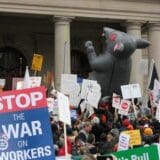
It seems appropriate that after Michigan Governor Rick Snyder (R) shepherded through the state House and Senate the right-wing extremist and corporate CEO backed “right to work” for less legislation—that he had long-called “too divisive to pursue”—without any public input, that he would sign the measure in secret Tuesday.
With as many as 15,000 people swarming the state Capitol in Lansing denouncing Snyder and the legislature for bowing to the likes of the Koch brothers, Grover Norquist, the American Legislative Exchange Council (ALEC) and the extremes of the Republican Party, Snyder retreated behind closed doors to sign the legislation and, only after the fact, announced his signature. Here are some details of the legislation that, if it follows the pattern of “right to work” laws in other states, will lower the standard of living for Michigan workers.
» Read more about: Facts About Michigan's New Anti-Union Law »


On the day North Korea launched a missile this week, the virulently anti-labor website Union Facts splashed a banner on its home page that likened union membership to living in North Korea. This was December 11, when a lame-duck legislature turned Michigan into a right-to-work state — banning unions from collecting fees or dues from workers as a prerequisite for working in unionized shops. (In a shrewdly divisive ploy, Republican bill-sponsors exempted police and firefighter unions from the law.)
In this week’s tightly scripted political theater, Lansing’s two legislative houses raced through their synchronized movements as though the capitol were afire. Later, hitting his marks on cue, Governor Rick Snyder emerged from the wings to sign this coup d’etat into law. (To think, only a few months ago the New York Times was giving Snyder the Profiles in Courage treatment, portraying him as that mythical unicorn of a politician,
» Read more about: Puppet Government: What the Michigan Vote Means »


A record number of billionaires are dodging potential tax increases by taking taxpayer-subsidized Christmas bonuses from companies they control. Their windfall stems from a Bush administration tax loophole known as “qualified dividends.” This scheme, completely legal thanks to Bush-era tax cuts, will expire December 31. It lets some wealthy heirs and other stockholders pay taxes on at less than half the rate you and I pay on wages or interest income.
At least 150 corporations are helping rich shareholders shelter $20 billion in corporate earnings by issuing “special dividends” before year’s end. Additional last minute tax avoidance schemes will cut taxes for other One Percenters, including corporate lawyers and private equity investors.
Edwin Durgy, who monitors “America’s billionaires and how they got that way” for Forbes, identified 10 top tax avoiders who together stand to gain more than $500 million.
» Read more about: The Rich Played Santa to Themselves — On Taxpayers' Dime »


The California Federation of Teachers, AFT, AFL-CIO, officially released an animated cartoon video on Tuesday, December 4, narrated by Ed Asner, that lays out the case for fair taxation. The union video urges Congress to repeal Bush-era tax cuts for the wealthiest Americans.
CFT President Joshua Pechthalt:
Following the decisive victory of Prop 30 in California, this video promotes a fair tax system to fund America’s priorities. The best way to build a better American education system and protect the social safety net is by asking those who can most afford it to pay their fair share in taxes, so that educators will be better positioned to help our students achieve their dreams.
Tax the rich: An animated fairy tale, with animation by award-winning artist Mike Konopacki, was written and directed by yours truly. The eight-minute cartoon shows how we arrived at this moment of poorly funded public services and widening economic inequality.
» Read more about: "Tax the Rich" Video and Why Fox News Hates It »
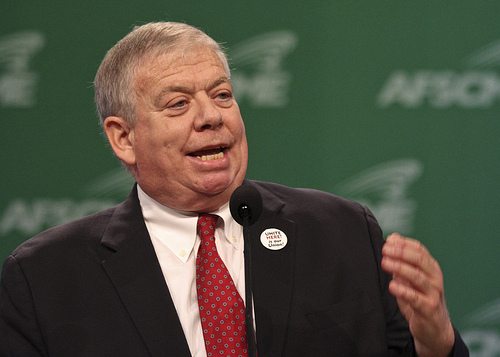

It’s hard to define good leadership, but we all know it when we see it in action. Leaders we truly respect inspire us with their vision and feel trustworthy in both their personal and professional lives. They are smart strategists but also have a balanced sense of themselves – brilliant but not arrogant. And most important, they are able to genuinely connect with, and respect the people they aspire to lead.
In late November John Wilhelm, the highly regarded president of the national hotel workers’ union (UNITE-HERE), stepped down from his position at the age of 67 to make way for a new generation of leaders in his organization. During John’s tenure the union developed a deep bench of committed worker-leaders, organizers and strategists who he helped recruit and nurture over his 43 years with the organization. John populated this bench by sharing information, skills and decision-making with those he developed while expecting the highest standards of effectiveness and hard work.


After spending more than $1.6 billion, Tesco, the world’s third- largest food retailer, has finally thrown in the towel and announced the closure of its Fresh & Easy stores. This move brings closure to the British company’s effort to establish a foothold in California’s highly competitive grocery industry. Many analysts believe this decision has been a long time coming, with Fresh & Easy stores never seeing the kind of market penetration that the U.K.-based giant expected from the chain. Investors cheered the December 5 announcement, but U.S. workers have reason to celebrate too — this marks the end of a five-year struggle with Tesco.
Like most new entrants into the grocery market field, Tesco planned to operate non-union. Indeed, a Tesco employee-relations director described the primary responsibilities of that job in an advertisement as “maintaining non-union status” and “union avoidance activities.” The United Food and Commercial Workers union (UFCW) sought to organize the company,
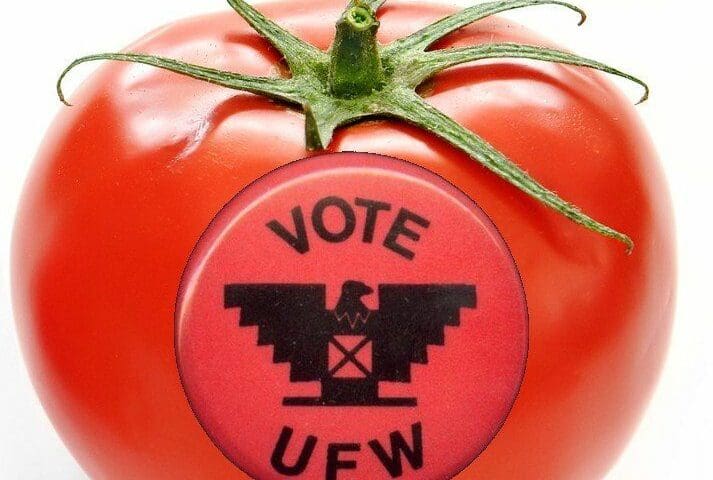

’Tis the season of miracles. There’s only enough oil to light the lamp for a couple of days, but it stays lit for eight. A peasant’s vision upsets a bishop, especially when the peasant returns with roses. Darkness grows until the earth shifts and the light returns. A child born in a stable turns out to be a presence of God. A festival celebrates the principles that make the miracle of human community. A star moves across the sky guiding astrologers on a quest.
These ancient tales and festivals, developed around the miracles of light and life, create the season’s themes of hope and love and peace. There are unsung miracles as well — happening in our own time that you will never read about in the papers or see on the nightly news. These stories tell about people without power claiming their strength and about the lowest-wage workers achieving victories.


Over the past year we’ve written quite a bit about the business of sports, and unfortunately, lockouts in the National Football League (NFL) and National Basketball Association (NBA) have given us quite a bit to discuss. We haven’t said much about things going on in the National Hockey League (NHL), perhaps because the script has come to seem so familiar, and there seemed little doubt that after some fireworks, things would finally result in a an unsatisfying deal that got everyone back on the ice a bit late, but in time for a meaningful season. Now it’s December, and they still ain’t playing.
Hockey’s labor history is a sorry one, as the league’s union was run for decades by a shill for the owners who stole money and helped the bosses keep the players in poverty well past the point you’d think that’d be true. In the ’90s, however, players started to make real money,
» Read more about: Hockey League Turmoil: Gary Bettman’s Ruler »


Here’s an arresting little statistic: Americans could create 200,000 jobs if we spent $64 out of the $700 that we will average for gifts this holiday season on American-made products. This fact comes from our friends at Labor 411, the group that puts together lists of union-made goods and services – everything from apparel to pet food to board games. And, just so you don’t think you’d have to stock up on $64 worth of Crayola Crayons to help create those 200,000 jobs, Labor 411 has put together a holiday shopping list that highlights a range of items, produced with union labor, including:
Check the list above for a complete inventory!
» Read more about: Buy Union-Made Gifts This Holiday Season »


I’m going to be frank – I’d do just about anything for a good union job. But as a twenty-something worker with limited job experience who’s been seeking permanent, full-time employment for nearly a year, I’d be willing to take just about any job.
But I’d really like a union job.
Not just for the job stability, solid wages and good benefits (don’t get me wrong, those are huge selling points), but because I want to be part of the historic and ground-breaking movement that’s responsible for creating, growing and maintaining America’s middle class.
As a member of a union household, I’ve experienced first-hand the benefits that unions can bring to young families like mine. But when I look around at my friends and others my age, it’s clear that my family is in the exceptionally fortunate minority. Most of our friends (regardless as to whether they have high school diplomas or law degrees) would bend over backwards to have the job security that my wife does.
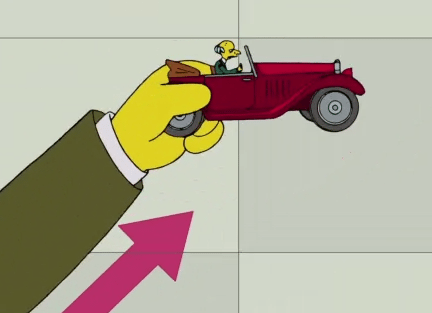


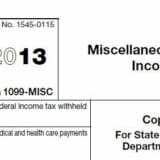
“Want to avoid paying half of your employees’ Social Security tax? Reclassify them as ‘independent contractors’ so they pay it all themselves. Make them fill out a 1099. ‘That’s not a fulltime busboy, that’s Juan Co., LLC. Don’t forget to invoice us, Juan Co.’”
(John Stewart, The Daily Show, November, 2012)
As far back as 1989, a Government Accounting Office study found that 38 percent of the employers examined misclassified employees as independent contractors. As a labor lawyer for the past two decades, I’ve represented hundreds of bakery drivers who deliver and shelve bread and chips for grocery stores. In that industry, some companies use employees, some use independent contractors, and some use both, yet I have seen a steady shift away from employees. Why? By labeling workers “independent contractors,” bakeries (and grocery stores), like the Port of Los Angeles,
» Read more about: Corporate Magic: Turning Employees Into Contractors »
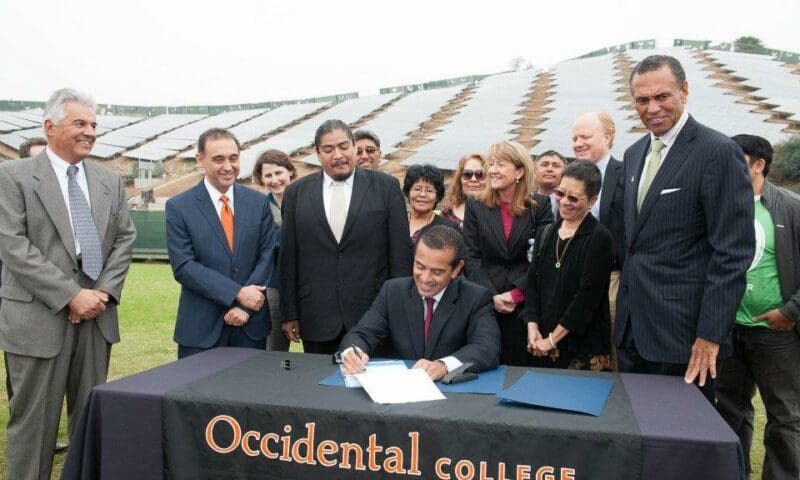

Thursday, December 6, Los Angeles Mayor Antonio Villaraigosa signed two ordinances passed by the City Council approving the long-term purchase of solar power from a new development on tribal land in Nevada. The clean energy produced there will be enough to power more than 100,000 homes for 25 years.
The agreement is important here in Los Angeles, as the city moves away from coal and towards solutions like renewable energy and energy efficiency.
But we need more from our investments than clean energy alone. We need that investment to lift up communities that have been struggling in this economy. Thanks to the work of advocates over the years, some political leaders are embracing that connection.
“These solar contracts are proof-positive that environmental progress and economic growth go hand-in-hand,” Mayor Villaraigosa said Thursday. The signing ceremony took place at Occidental College, which is home to its own solar array.
» Read more about: Nevada Solar Project: Turning on the Sun for Clean Energy »


A year or so ago, while picking up socks off of the living room floor, and considering the innumerable tasks of being a single parent, I exclaimed to my kids, “You know what? We think what we need is more money, but what we really need is community.”
It occurred to me that I was upset about my money flow, but I was equally upset about the growing sense of isolation that comes with a lack of connectedness with the people in my apartment complex, my street and my city.
Little did I know that those words that tumbled from my mouth would soon be so prophetic for me and the community I live in.
A long-time resident of Long Beach, I was raised in a multicultural working class neighborhood in the city. We weren’t rich–Dad is a military veteran and Mom worked for the phone company–but my family owned their home and impressed upon us a strong work ethic.
» Read more about: Enriching the Community with a Living Wage »


Tuesday, the Los Angeles Times editorial board encouraged measured consideration when it comes to how much private matters should impact a public figure – in this case Andrea Alarcon, the president of the L.A. Board of Public Works Commission. The editorial acknowledges that no charges have been brought against Alarcon, and that personal troubles are not always relevant to whether a public servant can continue to do their civic duty. (Certainly, Alarcon isn’t the first L.A. public official in recent memory who has kept working despite a private issue.) This reasoned editorial was refreshing, particularly given that L.A. Times reporters have heretofore covered the family matter, for which there has been no arrest or charge, as if it were the latest celebrity gossip.
Alarcon’s tenure with the City should be judged solely on her job performance – and she is an incredible asset to Los Angeles. She has been a champion for reform not only of L.A.’s waste and recycling industry,
» Read more about: A Thoughtful L.A. Times Editorial on Andrea Alarcon »
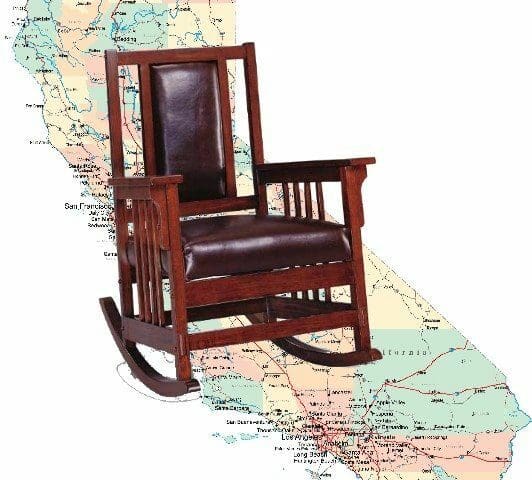
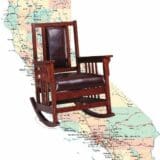
I want to vote for a comprehensive bipartisan plan to address the fiscal cliff. I’m willing to take a tough vote. I’m willing to make sacrifices. I’m willing to feel the heat. But I’m not willing to solve the fiscal cliff by throwing seniors over the cliff. I draw the line at cutting benefits in Medicare and Social Security.
This week, House Republicans unveiled their fiscal cliff counterproposal. While they continue to call for an extension of the Bush tax cuts for millionaires and billionaires, they propose offsetting this cost by gutting Medicare benefits, including raising the age of Medicare eligibility to 67. I won’t go there. As California’s Insurance Commissioner for eight years, I know this would be horrible policy, throwing millions of seniors into the rapacious hands of an insurance industry interested only in profits for its shareholders.
Medicare is a promise we made to seniors more than four decades ago.
» Read more about: Fiscal Cliff Notes: Protecting Medicare and Social Security »


Lawsuits alleging wage and hour violations are on the rise, but a case currently before the Supreme Court could tilt the balance of power toward employers in wage theft cases.
The Supreme Court heard oral arguments in Symczyk v. Genesis Healthcare Corp. on Monday; the American Prospect summarizes the details of the case:
The case involves a lawsuit filed by Laura Symczyk, who alleged that Genesis Healthcare had committed wage theft against her and her co-workers. According to Symczyk, Genesis routinely docked the pay of workers (including herself) for lunch breaks that were not taken. Reflecting the strength of her claim, Genesis offered her $7,500 plus associated fees to settle. Symczyk, however, rejected the offer, believing that she was suing not just for herself but for her co-workers. She wanted time for her lawyers to determine if her case could be brought as a class-action suit,
» Read more about: Supreme Court Could Block Worker Class-Action Suits »


When their incompetence kills good union jobs.
By now, we’ve all seen the outrageous headlines about Hostess executives getting $1.8 million in bonuses to liquidate their junk food company and eliminate 18,000 good jobs at bakeries and other facilities all across the country.
The company’s well-paid executives claim that union workers killed the company. Corporate propagandists echo this line, declaring that “Unions Killed the Goose That Made Hostess Brands Gold.”
Business experts know better. As an analyst at Forbes reported, Hostess executives killed the company because they “failed to reinvent its junk food product line and make it more enticing to health conscious palates.” To make a bad situation worse they let private equity firms “load up the company with debt” that enriched hedge fund investors without helping the company.
» Read more about: The Hostess with the Mostest … For the One Percent »


Well map test.